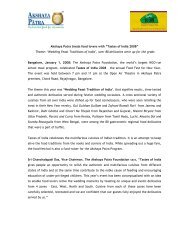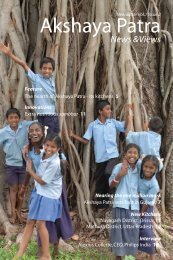The Top 100 NGOs 2013. - Akshaya Patra
The Top 100 NGOs 2013. - Akshaya Patra
The Top 100 NGOs 2013. - Akshaya Patra
You also want an ePaper? Increase the reach of your titles
YUMPU automatically turns print PDFs into web optimized ePapers that Google loves.
International<br />
Crisis Group<br />
24<br />
Founded in 1995, the International<br />
Crisis Group was created with the<br />
express purpose of being wholly<br />
independent from governments or<br />
international agencies. Since then, the<br />
Brussels-based organization has helped<br />
the international community to mitigate<br />
and prevent large-scale deadly conflict.<br />
<strong>The</strong> International Crisis Group employs<br />
a three-tiered approach of field-based<br />
analysis, policy prescription, and,<br />
finally, aggressive advocacy. Yet, it is<br />
the sheer scope of the organization’s<br />
operations that makes it stand out from<br />
the crowd, with programs across more<br />
than 70 regions. This unique expertise<br />
has been used time and time again in<br />
especially sensitive contexts, including<br />
crisis alerts in Ethiopia-Eritrea,<br />
Darfur, Somalia and Pakistan, as well<br />
as behind the scenes support for peace<br />
negotiations in Sudan, Burundi and<br />
Northern Uganda.<br />
sPecial FeaTure sPecial FeaTure<br />
© icg © haBiTaT For humaniTy © DaviD esTraDa © Dirk Jan verkuil<br />
© FrienDs inTernaTional<br />
© gerarD reilly<br />
57 58 59 60<br />
61<br />
62<br />
a gloBal neTwork oF conFlicT PrevenTion aFForDaBle housing For Families in neeD selF-susTaining PoverTy alleviaTion FinDing <strong>The</strong> hoPe amiDsT DisasTer<br />
securing <strong>The</strong> FuTures oF marginalizeD youTh <strong>The</strong> susTainaBle FuTure oF Design<br />
Habitat For<br />
Humanity<br />
4 5<br />
NEW<br />
16 33<br />
Emerging from an interracial<br />
Christian community just<br />
outside of Georgia, Habitat For<br />
Humanity was founded on the premise<br />
of “partnership housing” - building<br />
sustainable structures alongside<br />
volunteers, with beneficiaries offered<br />
affordable loan terms and expected<br />
to contribute reciprocally with labor.<br />
Since expanding internationally in<br />
1973, the organization has experienced<br />
impressive levels of growth. By 2012,<br />
Habitat For Humanity had successfully<br />
built 600,000 houses globally. In lower<br />
income countries, the organization<br />
partners with microfinance institutions<br />
to provide additional flexibility through<br />
incremental financing and group saving.<br />
Yet, Habitat For Humanity does more<br />
than simply build houses – initiatives in<br />
Honduras, for instance, have included<br />
home and health education, as well as<br />
domestic financial management.<br />
<strong>The</strong> gloBal Journal + January & FeBruary 2013<br />
KickStart<br />
International<br />
KickStart International began with<br />
the basic premise that “a poor<br />
person’s top need is a way to make<br />
more money.” In response, its founders<br />
developed a cheap and sustainable<br />
irrigation pump – the ‘MoneyMaker’ –<br />
to support African farmers in a move<br />
from subsistence farming to commercial<br />
agriculture. Reflecting the massive<br />
effect of a simple idea, the organization<br />
estimates that it has sold over 200,000<br />
pumps in Kenya, Tanzania and Mali,<br />
lifting almost 700,000 people out<br />
of poverty. Beyond this innovative<br />
low-cost technology, KickStart<br />
International is also demonstrating a<br />
strong commitment to refining and<br />
improving its model. <strong>The</strong> organization<br />
is partnering with the International<br />
Food Policy Research Institute on a<br />
three-year study to measure the impact<br />
of the pump on family health, nutrition,<br />
income, education and farming.<br />
ZOA<br />
Headquartered in Apeldoorn, but<br />
active throughout the world,<br />
ZOA (formerly ‘ZOA Refugee<br />
Care’) began as a student initiative in<br />
1973 offering assistance to Southeast<br />
Asian refugees. <strong>The</strong> organization now<br />
operates in 15 countries providing<br />
relief to people affected by conflict<br />
or natural disasters, and working<br />
with affected communities to recover<br />
their livelihoods and boost future<br />
resilience. ZOA’s three specific fields<br />
of expertise encompass livelihoods and<br />
food security, basic education, and<br />
water, sanitation and hygiene. Where<br />
possible the organization encourages<br />
collaborative work with NGO partners,<br />
and acts as the lead agency of the Dutch<br />
Consortium for Rehabilitation focusing<br />
on addressing fragility in Burundi, the<br />
Democratic Republic of the Congo,<br />
Liberia, Uganda, Sudan and<br />
South Sudan.<br />
Friends-<br />
International<br />
Founded in 1994 in Phnom Penh as<br />
a local outreach project for street<br />
children, Friends International<br />
has rapidly expanded its operational<br />
scope to encompass the entire Southeast<br />
Asian region, as well as Honduras,<br />
Mexico and Egypt. Working with<br />
marginalized children, their families<br />
and communities in urban areas, the<br />
organization is dedicated to ensuring<br />
this target population becomes<br />
productive and functional citizens.<br />
‘Friends Programs’ are focused on<br />
protection, reintegration, prevention<br />
and capacity-building, while the<br />
‘ChildSafe Network’ is a joint advocacy<br />
and service initiative educating travelers<br />
and reaching out directly to at-risk<br />
youth. As a means to offer practical<br />
training opportunities to disconnected<br />
youth, as well as increase overall<br />
sustainability, Friends-International<br />
also runs a number of social businesses.<br />
<strong>The</strong>gloBalJournal.neT<br />
76 77<br />
Architecture For<br />
Humanity<br />
hQ locaTion: Belgium hQ locaTion: uniTeD sTaTes hQ locaTion: uniTeD sTaTes hQ locaTion: ne<strong>The</strong>rlanDs<br />
hQ locaTion: camBoDia<br />
hQ locaTion: uniTeD sTaTes<br />
With exhibitions at MOMA<br />
in New York and dedicated<br />
glossy monographs,<br />
community-focused ‘social’ design<br />
is everywhere. San Francisco-based<br />
services firm Architecture For<br />
Humanity, however, has been leveraging<br />
the power of design for good since 1999,<br />
and presently comprises 52 chapters<br />
in 13 countries worldwide, directly<br />
serving <strong>100</strong>,000 people annually. Based<br />
on a credo of inclusive design that<br />
spurs lasting change, the organization<br />
focuses on poverty alleviation, disaster<br />
mitigation and reconstruction, postconflict<br />
community building and<br />
spaces meeting the needs of at-risk<br />
populations. It has also developed the<br />
groundbreaking ‘Open Architecture<br />
Network’ – the first open-source<br />
repository of architectural plans<br />
and drawings aimed at fostering<br />
knowledge sharing.





